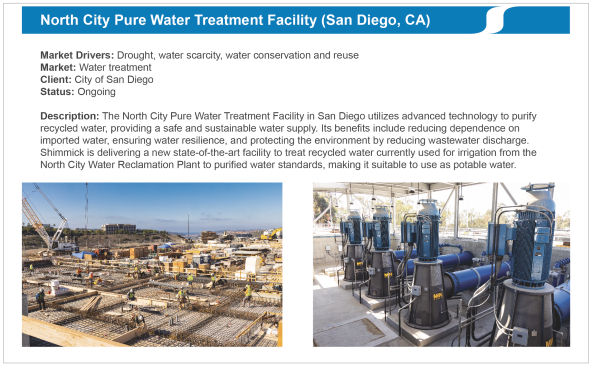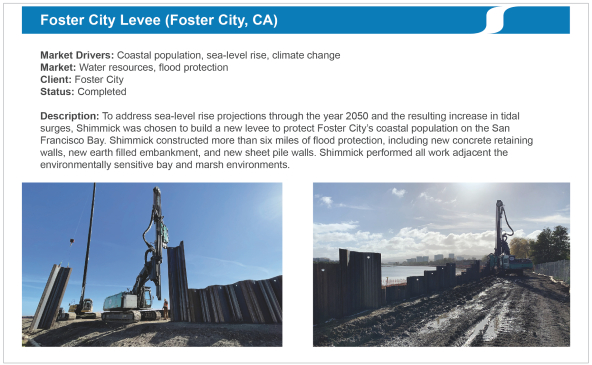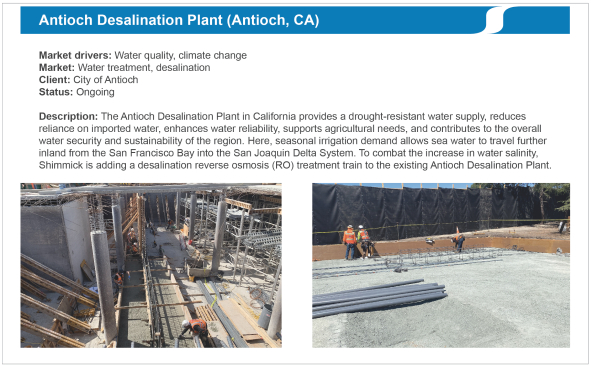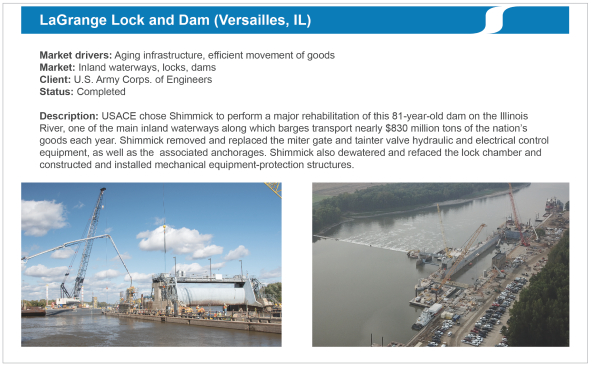These contractors include Barnard Construction Company, Inc., Ames Construction Inc., Dragados USA Inc., Flatiron Construction Corp., Fluor Corporation, Michels Corporation, Granite Construction Incorporated, Kiewit Corporation, Skanska USA Inc., Traylor Bros., Inc., and Walsh Construction Group, LLC, among others.
We also compete against smaller, specialized companies that focus on niche areas within the infrastructure space. These specialized firms might possess particular expertise in areas like water treatment technologies or facility rehabilitation. On smaller, regional projects (primarily in California), we will often compete against small or mid-sized regional contractors. These include C. Overaa & Co. Inc., Pacific Hydrotech Corporation, J.F. Shea Co., Inc., Western Weather Constructors, Inc., Steve P. Rados, Inc., Myers and Sons Construction, LLC, and Anvil Builders Inc.
In some cases, projects are awarded based on “best value.” Criteria that may influence our competitiveness include price, technical approach, past performance, plans for quality, equipment resources, financial strength, surety bonding capacity, relevant project experience, knowledge of local markets and conditions, and project management team and experience. For this reason, Shimmick is highly selective in the projects we pursue, pursuing only those in which we have a distinct advantage.
Types of Contracts and the Contract Management Process
Types of Contracts
We provide general contracting and construction management services necessary to deliver a project. These may include planning, scheduling manpower and equipment, and managing materials and subcontractors, all of which are required for the timely completion of a project in accordance with the terms, plans and specifications contained in a construction contract. We provide these services under traditional general contracting arrangements, such as fixed-price, construction manager/general contractor or design-build and, to a lesser extent, guaranteed maximum price and cost-plus contracts. These contract types and the risks generally inherent therein are discussed below:
Fixed-price (“FP”), contracts, which include fixed unit price contracts, are generally used in competitively bid public infrastructure projects and generally commit the contractor to provide all of the resources required to complete a project for a fixed sum (lump sum) or at fixed unit prices. Usually, FP contracts transfer more risk to the contractor but offer opportunity, under favorable circumstances, for greater profits. FP contracts represent a significant portion of our publicly bid infrastructure projects. Design-build projects are also generally performed under special FP contracts.
Cost reimbursable contracts provide for reimbursement of the cost required to complete a project plus a fee. The fee is typically negotiated and could include an incentive fee based on cost and/or schedule performance. Cost-plus contracts minimize the contractor’s financial risk but may also limit profits.
Historically, a high percentage of our contracts have been fixed-price. These contracts are typically awarded to the lowest bidder, although the contract bidding process has changed to include “best value” contracting. Winning these contracts requires the submission of a statement of qualifications and/or proposal in addition to project pricing. The specific requirements for these submissions differ greatly by customer but generally consider the technical capabilities of the bidder, the specific approach to the project, performance on past projects, safety records, and the proposed project team, among others. The proposals and price are subjected to scoring criteria previously outlined in the solicitation to determine which submitter has provided the “best value” to the customer. A "best value" solicitation is often used for design-build and/or federal projects.
Selective Bidding Process and Project Management
We identify new business opportunities through a variety of sources, including customer relationships, industry networking, subscriber services that notify us of all contracts out for bid, advertisements by federal, state and local governmental entities, business development efforts, and one-on-one meetings with other participants in the construction industry, among others. The projects we pursue often undergo a long planning phase, which enables us to identify them well before they are advertised for construction for more accurate forecasting and resource
89




